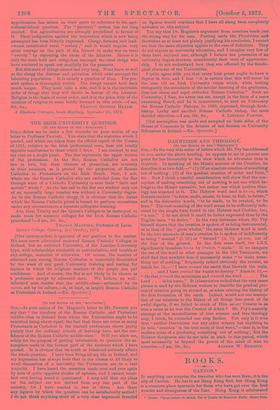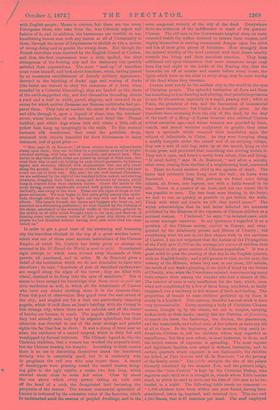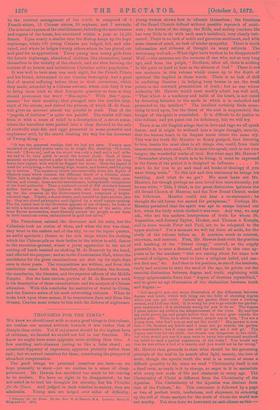BOOKS.
'CANTON.* IF anything can surprise the traveller who has seen Siam, it is the city of Canton. He has to see Hong Kong first, but Hong Kong is a common-place spectacle for those who have got over the first wonder and strangeness of the East. Hong Kong is adulterated
• Canton: Voyage autour du Monde. Par le Oomte de Beauvoir. Paris: Henri Pion-
with English people; Macao is curious, but there are too many Portuguese there, who take from the true Celestial aspect and fashion of it, and, in addition, the barracoons are terrible to see, humiliating honest men with any leaven at all of Christianity in them, through the sense of helplessness to abolish so vile a system of wrong-doing and to punish the wrong-doers. But though the French travellers were received by the English Consul at Canton, and thus the first impressions were a little spoiled, the utter strangeness of the floating city and the stationary city speedily satisfied their expectations. The most "used-up" of travellers must rouse himself, and look about him there, when, having passed by an enormous establishment of fiercely military appearance,
devoted to the hatching of ducks' eggs and rearing of ducks (the latter are trained to obey the summons of a horn when sounded by a Celestial Dummling), they are landed on the shore of the earth-supported city, and find themselves threading streets a yard and a half in width, paved, slippery, and crowded to an
excess for which neither Javaiaese nor Siamese multitudes had pre- pared them. They take at random the street of the fishmongers, and slide through it, upon a deposit of slime, into the butchers' street, where bunches of rats, flattened and dried like 'Finnan haddies', and edible dogs whose tails still retain a little tuft of yellow hair, hang up temptingly in the stalls. To this succeed immense silk warehouses, then come the porcelain shops, crammed with objects beautiful for their hideousness in many instances, and of great price :—
" 'Bnt,' says M. de Beauvoir, 'all these streets have an indescribable stamp upon them ; they are trodden by a population arrayed in bright- coloured clothing, with long tails of horsehair, and pointed hats. Man- darins in sky-blue silken robes are jostled by strings of blind men, who wind their way in and out, holding by each other's garments; by hideous lepers, and wretches afflicted with elephantiasis who can only crawl along the ground. Bands of vigorous coolies elbow the crowd, and push every one out of their way. But, alas! for one well-dressed Chinaman, we are saddened by the sight of two hundred infirm, naked, and starving creatures, dragging their limbs along, and devoured by vermin, which hang in clusters from their skeleton bodies. Above the heads of this noisy throng, scarlet signboards covered with golden characters hang vertically, and swing in the wind. These are the signs of shops or reli- gious sentences. We soon began to feel quite giddy among this multi- tude, through which we bad to fight our way with our flats and our elbows. The insects forsook the lepers and beggars who beset us, and accorded us a distressing preference ; we were dazzled by the richness of the shops, astonished at the wonderful traffie of the coolies, grieved by the misery on all sides which brought tears to our eyes, and desirous of forming some really correct notion of this great city, thirty of whose streets we had threaded without having ever seen more than ten steps before us.".
In order to get a good view of the swarming and humming city the travellers climbed to the top of a great wooden tower, which was one of those most ancient institutions of the Chinese
Empire, of which Mr. Carlyle has lately given so strange an account in his All Round the World, a mont de piete. It contained eight storeys, in which were stowed away thousands of little parcels, all numbered, and in order. M. de Beauvoir gives a detail of the institution which we do not remember to have seen elsewhere ; he says, "hundreds of pots of varnished earthenware are ranged along the edges of the tower ; they are filled with vitriol, destined to be flung into the eyes of assailants." But it seems to have escaped his knowledge that these monts de piete are civic wardrobes as well, in which all the inhabitants of Canton who have any winter clothing store it in the summer-time. From this post of observation they gazed over the vast extent of
the city, and singled out for a visit one particularly imposing pagoda, which it took them an hour's battling with the throng in this strange city, where there are no vehicles and all the beasts
of burden are human, to reach. The pagoda differed from those they had already seen only by its superior splendour, but their attention was directed to one of the most strange and painful sights the far East has to show. It was a clump of trees near an altar, the residence of a sacred-serpent, which is daily fed and worshipped by fervent believers. The Chinese legend is, like the Christian tradition, that a woman has crushed the serpent's head, but the Chinese worship the tempter. According to their maxim there is no use in disturbing themselves about the beneficent divinity who is essentially good, but it is eminently wise
to propitiate the evil one who may injure them. A crowd of worshippers were pressing round the sacred bushes, bring- lug gifts to the ugly reptile, a snake two feet long, which crawled about close to some hot ashes. Close by stood the urn above which every person taking an oath cuts
off the head of a cock, the decapitated bird becoming the perquisite of the bonzes. The ancient commercial splendour of Canton is indicated by the extensive ruins of the factories, which
lie undisturbed amid the swarms of peopled dwellings, and in the
more congenial vicinity of the city of the dead. Everywhere' there are evidences of the indifference to death of the genuine' Chinese. The old men in the Government hospital sleep on mats- extended beside the coffins destined to receive their corpses, and employ themselves in carving ornamental designs upon the sides and lids of these grim pieces of furniture. How strangely does the natural worship of the dead contrast with their classic cruelty towards the living and their merciless exaction. They heap additional toil upon themselves that more numerous lamps may burn day and night in the barks of the floating city, that the fireworks let off at sunrise and sunset before every house, the' lights which burn on the altar in every shop, may be more worthy of the dead whom they venerate.
Canton must surely be the saddest city in the world in the epee of Christian people. The splendid barbarism of Java and Siam has something in it so dazzling and alluring, that painful impressions do not fix themselves, especially in a rapid, passing visit ; while at Pekin, the grandeur of ruin and the fascination of immemorial time assert themselves ; but Canton is a dreadful place. As the travellers were returning from the city of the dead, by the way of the tomb of a Ming—a Tartar General who subdued Canton several centuries ago—and whose remains are guarded by lions, camels, and armed warriors sculptured in granite, they came upon a spectacle which removed their incredulity upon the subject of infanticide in China. As they were hurrying along a muddy footpath under the ruined wall of an outlying village, they saw a sort of mat-bag, sewn up at the mouth, lying on the frozen gram, and perceived that something was stirring within it. They cut it open, and found a newly-born infant, blue and dying. "It cried feebly," says M. de Beauvoir, "and after a minute, other cries, coming from the foot of a neighbouring bush, answered it. There we found another child in the agonies of death. The latter had evidently been flung over the wall ; its limbs were
fractured Along this pathway we found seven dying infants, all frozen, one leprous, one with a knife-wound in its side. Seven in a quarter of an hour, and not one whose life it was possible to save. The tam-tams were beating in the forts ; we had to run as quickly as possible to get within the walls. Think with what sad hearts we left that horrid scene I" The writer acknowledges that he had never believed the accounts published by the Missions of the exposure of Chinese children as a national custom. "I believed," he says, "in isolated cases, such as occur amongst ourselves. In my ignorance I regarded it as a question of the Chinese assizes, exploite in Europe, and exag- gerated by the missionary priests and Sisters of Charity ; bu considering what we saw in our first chance walk in the environs of Canton, I am not surprised that the Annals of the Propagation of the Faith give 25,000 as the average per annum of children thus abandoned in the great centres of Chinese population." It was a great relief to pass the evening of that day in the English quarter, with an English family; and a still greater to visit, on the next, the nursery of the Mission, where they saw, in one room, 250 infants, the result of one week's gleaning in the field of blood by the Sisters of Charity, who, when the Frenchmen entered, were removing many little corpses from among the number who had a chance of life. The number of nuns is very insufficient for the task, which, even when not complicated by a few of them being murdered, as lately happened, has a tendency to kill women of faith and feeling. The proportion of female to male children gathered up by them is ninety in a hundred. This carious, dreadful harvest-work is done very systematically. Every morning a body of Christian Chinese women, brought up by the sisters, set out in couples, carrying basket-hods on their backs, exactly like the Parisian chiffonnieres, to search the lanes, the faubourgs, the ditches, the plantations, and the waste lands, and collect such of the infants as have any life at all in them. In the beginning of the mission, they easily in- duced the Chinese to sell the children whom they regarded as superfluous ; but they now refuse, in most instances, to do so, and the horrid custom of exposure is spreading. The most regular- and legitimate families now adopt it without hesitation, and in certain quarters where exposure is not fashionable, the children' are killed, as Pere Guerin told M. de Beauvoir, "in the privacy of the family circle." The creche occupies the site of the palace formerly inhabited by the monster Yeti, and the porter's lodge, where the " liste d'entree " is kept by the Christian Bishop, who registers each child as it is brought in, stands where Yeh's bureau stood, in which he used to write out his lists of 500 men to be be- headed in a night. The following table needs no comment :— " 4,883 children have been within one year found, having been abandoned, taken up, baptised, and received here. This has coat 4,245 francs, that is 87 centimes per head. The staff employed
French sisters, 15 Chinese sisters, 30 orphans, and 7 servants.
The internal expense of the establishment, including the maintenance and repairs of the house, has amounted within a year to 14,534
francs. Upon nearly a similar sum the Bishop keeps up the boys' orphanage, where 100 young Chinese are lodged, fed, and edu- cated, and where he lodges twenty others whom he has placed out and paid for as apprentices; These young men marry girls from the female orphanage, abandoned children like themselves, instal themselves in the vicinity of the church, and are thus forming the nucleus of an honest and industrious Christian native population."
It was well to have seen one such sight, for the French Prince and his friend, determined to see Canton thoroughly, had a good deal of mental suffering before them in their excursions, which they made, attended by a Chinese servant, whose sole duty it was to bring them back to their European quarters so soon as they should pronounce the word " Sha-myen." With this " open- sesame " for their security, they plunged into the terrible laby- rinth of the streets, and visited the prisons, of which M. de Beau- voir gives an account almost too painful to read. That of the "pagoda of tortures "is quite too painful. The reader will turn from it with a sense of relief to a description of a street scene, where the travellers were pushed into a shop devoted to the sale of avowedly stale fish and eggs preserved in some powerful and unpleasant acid, by the crowd clearing the way for the Governor of Twang-Kong :—
"It was the queerest eort6ge that we had yet seen. Twenty men -mounted on piebald ponies came on, in single file, shouting 'Hon-cub, ton-ouh ' [Move on], and as the street was only a yard and a half wide, we had to be very quick to avoid the horses' hoofs. Each of these majestic cavaliers carried a pike in one hand, and in the other his long horse-hair pigtail, with which he flogged his horse. Here the pigtail is used for everything,—for beating dogs, women, and horses, and for going ap to heaven. The squadron climbs unconcernedly down the flights of slippery steps which conned the different levels of a Chinese street. Then, still in single file, come the lictors in red, carrying whips, axes, -sabres, and chains ; these are the executioners, indispensable companions of the local authority. Then a confused crowd of 200 standard-bearers defiles before us, beggars, hideous with dirt and leprosy, dressed up for the occasion in the Government livery, composed of bright- 'coloured rags. Finally, a dozen chairs, each carried by eight porters, pass by ; they are closed palanquins, each lighted by a small square opening. The fat, round face of the Governor appears at one of these ; he looks at us with a ferocious scowl, and the eighteen officers of his suite, who wear Tartar moustaches, more liberally permit the people to see them in their luxurious robes, embroidered in gold and diver."
The Frenchmen saluted the Governor and his suite, but the Celestials took no notice of them, and when the way was clear, they went to the eastern end of the city, to see the lepers' quarter, an awful spectacle ; thence to the rich shops where the clothing which the Chinese pile on their bodies in the winter is sold, thence to the execution-ground, where a jovial apprentice in the art of cutting off heads insisted on shaking M. de Beauvoir by the hand, and effected his purpose; and so to the Examination Hall, where the 'candidates for the great examinations are shut up for eight days -once in three years. The compositions are written, and from this institution come forth the bachelors, the licentiates, the doctors, the mandarins, the literates, and the superior officers of the Middle Empire. Not the least curious portion of M. de Beauvoir's work is his description of these examinations and his analysis of Chinese education. With this concludes his narrative of travel in China, and the Eastern series of his most interesting volumes. When be looks back upon those scenes, if he remembers Java and Siam like dreams, Canton must return to him with the distress of nightmare.




































 Previous page
Previous page